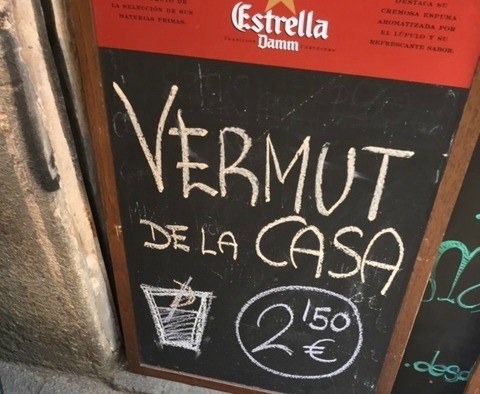Dear Hipsters: Barcelona's Vermouth Scene Is Every Bit As Dicty As Suspenders, Handlebar Mustaches, And Thick-Rimmed Glasses
Legend has it that water from Font de Canaletes, an ornate fountain on Barcelona's La Rambla, casts a spell on all who drink it.
But for my money, Barcelona's locally-made vermouth (or vermut, as they call it) is the real magical potion that inspires visitors to fall in love and return again and again.
A far cry from the mass-produced version used in martinis, Barcelona's vermut is served straight up on ice with a pimento-stuffed olive and either an orange or lemon slice.
Every bar has its own house recipe and bartenders would rather surrender their corkscrews than reveal exactly which herbs, roots, flowers, seeds, and spices were added to their own "vermut de la casa." You'll recognize it right away, sitting behind the bar (or sometimes on the bar) in miniature oak barrels, usually with some unbelievably low price chalked on the front.
Distilleries throughout Catalonia have been making vermut for more than a century. And though it never disappeared from old school bars, it did lose favor after the Spanish Civil War. I think it's safe to say this tawny-colored liquor is currently experiencing a full-frontal renaissance.
Artisanal, small batch vermut can be found all over Barcelona — from trendy restaurants and rooftop clubs to tiny eight-chair hipster bars. There are even dedicated vermuteos that dispense this unique blend of wine fortified with 96 percent proof alcohol, sugar, and up to 200 florals, spices, barks, and bitter herbs — a concoction first recommended by Hippocrates himself.
In Barcelona, to "fer un vermut" (literally "to do a vermouth) is a ritual that involves a type of commitment. You don't chug vermut. You do it with friends, over deep conversation, with the sole purpose of creating community.
As Marta, my Street Art and Graffiti guide explained, "It's a thing you do especially on Sundays, after Mass, before lunch. Vermut is designed to open the appetite and open the heart."
I'm partial to it because, while the appetite and heart might be wide open, the wallet is only slightly ajar. Barcelona's vermut, a far cry from its commercially-driven Italian cousins, sells for less than half the price of, say, Martini or Cinzano.
I bought two tall glasses of vermut yesterday (it was Sunday, after all) complete with a bowl of pickled carrots, olives, and onions for a measly €4 ($4.50).
And because it weighs in at whopping 15 percent alcohol, vermut offers Barcelona's best bang for the Euro and, as I said, the real reason visitors keep coming back.
